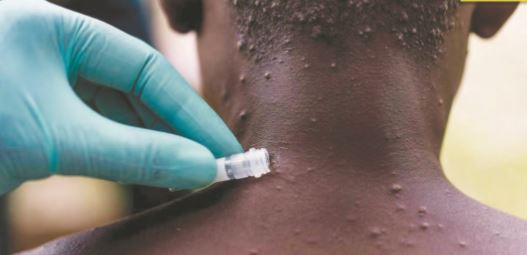
An emergency health team has been deployed to trace the origins of the rare disease in the Kumba and Mbonge health districts. At least 10 cases have so far been reported
The Kumba and Mbonge (Foe Bakundu) health districts in the Meme Division of the South West region are in the headlines again for the wrong reason: a new strain of the Mpox viral disease – previously called monkey pox – has been detected. At least 10 cases have so far been reported. The announcement by the South West Regional Delegation for Public Health comes barely six months after another outbreak was reported in the same health districts. “We are getting a second strain which in principle is the former West African strain. We need to do thorough investigation to know specifically how that strain originated in the region,” Dr Filbert Eko Eko, Regional Delegate for Public Health for the South West region told reporters Monday, May 22.
“We need to see that any person who is suspected should obviously be taken into high consideration such that the spread dose not continue from that person to another person,” he said. Monkey pox is a zoonotic infectious disease caused by the monkeypox virus, a member of the genus Orthopoxvirus in the family Poxviridae. Vaccines against the virus are not yet available in Cameroon but with the help of symptomatic treatment, the country has managed to minimize the rapid spread of the virus.
As at January 12, 2023, 116 suspected cases including 18 confirmed and 3 deaths were reported in Cameroon. Monkey pox lives naturally in certain animals (rodents, squirrels, monkeys, giant rats, etc.) and when transmitted to humans can cause infection.
Transmission occurs through close contact with an infected animal, human or material contaminated with the virus. Monkeypox can be spread by handling bushmeat, animal bites or scratches, body fluids, contaminated objects, or close contact with an infected person. Signs and symptoms of the disease begin with fever, headache, muscle aches, swollen lymph nodes, and fatigue. This is followed by a rash that forms blisters and crusts (papulo-vesicular rash).
“To prevent this disease, avoid close or prolonged physical contact with the sick person, wash your hands with soap and running water after contact with a sick person; do not handle sick animals or animals found dead of unknown cause; cook the meat well before eating it; keep rats away from homes; go immediately to the nearest health centre in case of fever associated with rashes; and finally, report cases of sick or dead animals to the veterinary services and/or to the service in charge of wildlife in the locality,” according to Dr Ikoum Dalida, veterinary doctor, manager of the National Program for the Prevention and Control of Emerging and Re-emerging Zoonoses in Cameroon.
“For health personnel, we also advise to systematically wear personal protective equipment when handling patients, to wash their hands regularly after visiting a patient,” she says.
Three of Cameroon's 10 regions - the Centre, the North-West and the South-West - have in recent years been prone to outbreaks of monkey pox. During the last outbreak, for example, the South West region accounted for more than 60% of all cases in the country. Over the past five years, outbreaks of monkey pox have been reported three times in the South West region of Cameroon.
“With socio-political unrest causing people to flee their homes, the locals have been pushed into the bushes where they now have more interaction with these monkeys and therefore the virus that normally lives in these animals is easily transmitted,” confirms Dr. Agwe Samuel Mbah, coordinator of the regional centre for the fight against epidemics and natural disasters for the South West region of Cameroon.
“People eat and hunt these animals which are often not well cooked, with some monkeys biting them,” he tells Cameroon Insider.








Comments